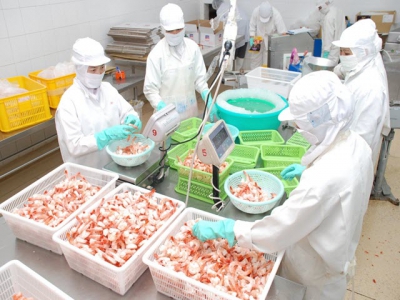Vietnams exporters face tougher Chinese food inspection regime

Vietnam’s agro-forestry-fishery exports to China face many difficulties due to stronger Chinese inspection and supervision of food safety.
Businesses need to meet the requirements of import partners
According to the Consulate General of Vietnam in Nanning (Guangxi Province, China), Guangxi is strictly managing goods consumed at markets and supermarkets as well as strengthening inspection of certificates on quality standards, origin and procedures relating to purchasing agricultural products. Guangxi bans trading and storage of foods that do not meet food safety standards and requires quarantine certificates from China customs for imported food products.
Dongxing City, China, across the border from Mong Cai City, Quang Ninh Province, is also carrying out inspections of origin and quality of seafood and meat products at agricultural markets, supermarkets and hotels.
Vy Cong Tuong, deputy director of the Lang Son Department of Vietnam Customs, said the Chinese market has increased its requirements on standards, quality and traceability. In particular, all Vietnamese vehicles entering China must buy vehicle insurance from July 1, 2020.
At the request of the Chinese market, the Ministry of Industry and Trade is recommending that businesses and households producing agricultural products and seafood exported to China enhance management of quality for their exports. They should also coordinate with import partners in China to ensure that their export products meet Chinese regulations on quality standards, quarantine, food safety and traceability. Businesses need to keep up-to-date with market information to regulate volume of export goods transported to border gates in order to lower risks and save time in customs clearance for goods at border gates.
Dang Phuc Nguyen, secretary-general of the Vietnam Fruit and Vegetables Association, said cultivation methods must be changed and packaging design improved in order to meet the needs of Chinese partners.
Nguyen Dinh Tung, board chair of the Vina T&T Group, said Vietnamese businesses are promoting the development of material areas to produce clean farming products, aiming to improve export value and increase their domestic market shares.
Vietnam needs to promote linkages between processing plants, businesses and producers in material areas in order to ensure product quality and increase product competitiveness.
Có thể bạn quan tâm
 Peppercorn exports: volume up, value down
Peppercorn exports: volume up, value down Vietnam exported 32,000 tonnes of peppercorn worth 80 million USD in April 2019, up 19.3 percent in volume but down 6.4 percent in value compared
 Precision farming, new technology and an eye for opportunity
Precision farming, new technology and an eye for opportunity Jozua has been piloting fixed-wing aircraft and helicopters since 1987. When the first GPS technology was introduced to civilian aviation, he immediately realis
 Pepper prices take nosedive
Pepper prices take nosedive Pepper growers around the country continue to see losses as pepper prices have dropped sharply to VND41,000 per kilogram, officials said.
 Asia Coffee: Vietnam domestic prices hit six-year low
Asia Coffee: Vietnam domestic prices hit six-year low Vietnam’s domestic coffee prices fell to the lowest level in six years on Thursday following a decline on the ICE.
 Agricultural products that meet standards will be easier to consume
Agricultural products that meet standards will be easier to consume On May 8, Director of Long An Department of Industry and Trade - Le Minh Duc chaired the working session with some departments, local authorities, businesses